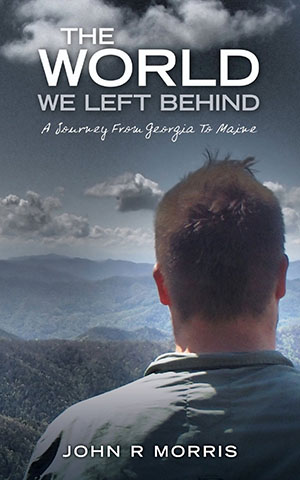[alert variation=”alert-info”]Publisher: The World We Left Behind
Formats: Paperback, Kindle
Purchase: Powell’s | Amazon | IndieBound | Barnes & Noble[/alert]
There are some parallels between Morris’ book, The World We Left Behindand Cheryl Strayed’s bestseller, Wild. Morris is fed up with working for six years as the graveyard shift at a nuclear holding facility. He spends his off-hours drinking and trying to find happiness with girlfriends, who never seem to quite work out for him. Lacking a college education, and finding little amounts of joy in his life, he decides to hike the Appalachian Trail from Georgia to Maine. He enlists a co-worker to go with him on the trip. Strayed’s situation was set off by the end of her marriage, but a similar sense of ennui and a lack of accomplishment.
There is a fundamental difference between the two trips, however. Strayed is a woman, hiking the Pacific Coast trail alone. Morris is traveling with his co-worker. Consequently from the beginning his trip is clearly less fraught with fear and danger.
Morris’ book is presented almost in the form of a journal. He leaves his girlfriend Melody, who has no understanding of why he wants to leave a safe and secure environment behind to go on what she regards as a wild goose chase. The author does a good job of explaining his total unpreparedness for the trip, and the physical difficulty of carrying a fifty-pound pack into remote areas. However, after a while, the reader tires of the day-to-day gusts of wind and rain and the constant soaking that the author undergoes – even when staying in what shelters exist on the trail.
This fairly lengthy book is only the first of three books about this journey. The author might have been better served to focus on specific adventures and days rather than to provide so much detail. His best work comes near the end of the book where he describes a one-day solo hike. Buffeted by winds, ice and rain, he constantly falls, and begins to suffer hypothermia. He is barely able to make it to a shelter, where a fellow hiker helps him to thaw out. If the rest of the book were this engaging and intense, it would make for a far better reading experience.
Overall, Morris presents a realistic view of the people he encounters during this trip. As would be the case in almost any circumstance, there are the friendly and the giving people, and the sarcastic and status-ridden people who populate the hiking universe. One of the oddities of the book is that in the various credits that the author gives to people who inspired or assisted him – his traveling companion Torrey is not among them. The reader is left to wonder whether this omission reflects future dissension. In general, the writing style is readable and easy to follow, and the minor grammatical issues can be easily overlooked.
[signoff predefined=”Sponsored Review Program” icon=”book”][/signoff]

